Fata Morgana Blu-ray Movie
HomeFata Morgana Blu-ray Movie 
Shout Factory | 1971 | 79 min | Not rated | No Release Date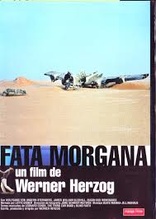
Price
Movie rating
6.2 | / 10 |
Blu-ray rating
| Users | 0.0 | |
| Reviewer | 3.0 | |
| Overall | 3.0 |
Overview
Fata Morgana (1971)
Footage shot in and around the Sahara Desert, accompanied only by a spoken creation myth and the songs of Leonard Cohen.
Starring: Wolfgang von Ungern-SternbergNarrator: Lotte Eisner
Director: Werner Herzog
| Foreign | 100% |
| Drama | 99% |
| Documentary | 24% |
| Comedy | Insignificant |
Specifications
Video
Video codec: MPEG-4 AVC
Video resolution: 1080p
Aspect ratio: 1.33:1
Original aspect ratio: 1.37:1
Audio
German: DTS-HD Master Audio 2.0
English: DTS-HD Master Audio 2.0
Subtitles
English
Discs
50GB Blu-ray Disc
Single disc (1 BD)
Playback
Region A (B, C untested)
Review
Rating summary
| Movie | 3.0 | |
| Video | 3.5 | |
| Audio | 4.0 | |
| Extras | 2.0 | |
| Overall | 3.0 |
Fata Morgana Blu-ray Movie Review
Herzogisqatsi.
Reviewed by Jeffrey Kauffman July 20, 2014Note: This title is currently available as part of Herzog: The Collection.
Has there ever been a more fascinating figure in film than Werner Herzog? This much debated individual, one who elicits
both hyperbolic accolades and equally exaggerated derision, has been a seeming force of nature in film for decades,
helping to define the New German Cinema (a somewhat later analog to the French New Wave). Herzog’s filmography is
rather breathtakingly diverse, traversing both traditional fiction, quasi-biographies, and a large number of
documentaries.
Through it all, Herzog himself has become the subject of considerable controversy, at times seeming to be as
obsessively
motivated as some of his film subjects. The auteur’s off kilter blend of nihilism and often black humor has given
him and his films a decidedly unique place in contemporary media, to the point that a supposed note Herzog jotted off to his
cleaning lady became an internet sensation (it’s actually a brilliantly written parody by Dale Shaw). Shout! Factory, a
label
which repeatedly stubbed its corporate toe on its last big deluxe boxed set built around the talents of one person (Bruce Lee: The Legacy
Collection, the only time in my reviewing career I have had to start over from scratch due to a complete recall
and reissue) may seem to be throwing caution to the wind by upping the ante with this release. Here there are no
fewer than 16 films by Herzog, housed in a handsome hardback booklike case that also features a wealth of text and
information about each of the films. Fifteen of the films are new to Blu-ray (Shout's horror imprint Scream Factory
released Herzog's Nosferatu the
Vampyre as a standalone a few months ago), and the offerings here cover both iconic films in Herzog's
oeuvre as well as some oddities. The extremely handsome packaging offers a 7.5" x 7.5" x 1.5" hardback book
exterior casing which houses heavy cardstock pocket holders that contain the discs. Also included are The Werner
Herzog Condition by Stephen J. Smith, an appreciation of the director's work with essays about each of the films.
The films get even more text in write-ups by Chris Wahl and Brad Prager. Each of the pocket holder pages details the
film (or in some cases, films) on each disc, with audio options and special features listed.
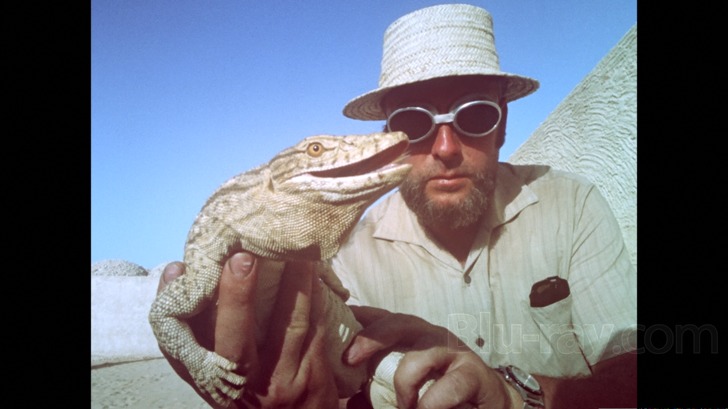
Armchair etymologists might be understandably elated over the kind of whimsical mishmash that the term fata morgana reflects (pun intended, as will soon be clear). Fata morgana can be shorthanded as “mirage”, but it actually refers to something much more specific, in other words, a type of mirage. The technical definition of a fata morgana is rather complex (almost comically so), but there’s a wonderful example of one in Werner Herzog’s eponymous 1971 film Fata Morgana, where what was evidently a car or some other object moving quickly gets reflected in a weirdly distorted way a considerable distance—perhaps scores of miles—from where it was actually located. The actual term fata morgana is cobbled together from similarly disparate elements, joining a Latin term referring to fairy with a reference to the sorceress Morgan le Fay from the tales of King Arthur.
Perhaps reflecting (sorry) that very marriage of terminologies, Werner Herzog’s film is similarly joined out of seemingly mismatched elements. Large parts of the film, especially the haunting opening images that repeat sights like jets landing (in an increasingly hot day, making the images more and more dreamlike as the heat waves start distorting the image) or hypnotically sinuous desert sands, seem like progenitors of Godfrey Reggio’s The Qatsi Trilogy. Much like with Reggio’s three films, Herzog here blends visions of nature and Man with an overtly religious subtext. In the case of Reggio, even his titles at least allude to a passing Hopi influence, while Herzog doesn’t just allude, he actually has selected phrases from a Mayan creation myth recited by Herzog’s mentor Lotte Eisner (and just for the record, Herzog also did the translations).
Even Herzog’s intertitles for the film’s three sections (another Qatsi “prophecy”?) have religious overtones. Creation, Paradise and The Golden Age might seem to be a quick précis of several major religions’ trajectories, but of course this is Werner Herzog, and irony therefore runs rampant. Creation is probably the least ironic, offering Eisner reciting the Mayan texts while long shots of the desert pass by like some arid hallucination. Paradise stays in the desert, but here the images are set to the mournfully philosophical music of Leonard Cohen, and we begin to see signs of “civilization”—which in this case means incredibly ramshackle villages and such odd sights as an empty car chassis resting upside down on the desert floor. The Golden Age is easily the most bizarre of the bunch, starting with what looks like a rejected act from The Gong Show and devolving into further absurdity from there. Notably, this is the segment with most actual humans in it, no mere coincidence.
Herzog has relayed both in print and on the included commentary how Fata Morgana was supposed to be a science fiction epic, but that once Herzog saw the footage, he realized he had a “different” type of film. That difference will probably split audiences along familiar lines. Those who consider Herzog an enfant terrible, a man who simply caters to his own self created excesses, will find plenty of evidence here to bolster that idea. On the other hand, those who consider Herzog a rare artist who actually invests at least much of his work with an abundance of thought (maybe too much thought at times) will similarly find that Fata Morgana holds up to that analytical tack.
The film is rather surprisingly static in the long run, despite its long tracking shots, and perhaps works better in hindsight as a conceptual gambit rather than when actually being seen as a film. That may ultimately be the biggest subliminal reason some have an issue with it. If Creation was okay until Man came along, maybe God should have stopped while he was still ahead. Whether God or Herzog, though, creators have a tendency to keep pushing on, regardless of the consequences.
Fata Morgana Blu-ray Movie, Video Quality 
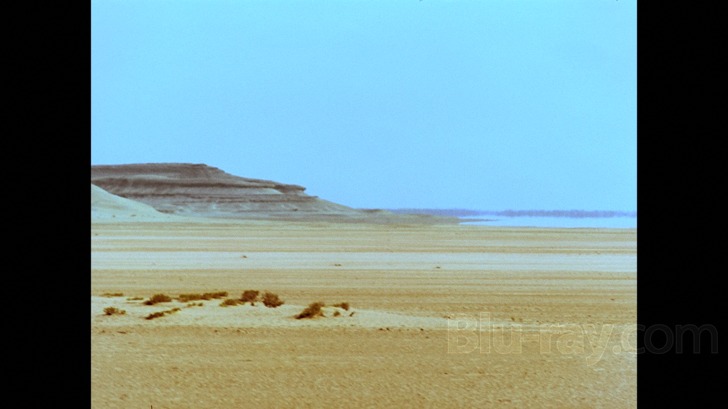
Fata Morgana features an AVC encoded 1080p transfer in 1.33:1. This transfer shows some of the same anomalies, though not in the same degree, that hobbled the recent release of Nosferatu the Vampyre, with a widely variant amount of grain that runs the gamut from almost none to relatively natural looking to swarming fields that tip into noise territory. This aspect is compounded by some minor but noticeable compression artifacts which crop up, especially in the desert footage. All of this said, Fata Morgana is on the whole a more satisfyingly organic viewing experience than Nosferatu was. Colors are beautifully reproduced and contrast is generally very strong. The many outdoor scenes offer exceptional depth of field. The image is not "sharp" by contemporary standards, but within the bounds of issues described above, offers a reasonably filmic experience with above average levels of detail. Elements are in excellent condition, with no major issues to report.
Fata Morgana Blu-ray Movie, Audio Quality 

Fata Morgana features DTS-HD Master Audio 2.0 mono mixes in both German and English (it should be noted that the English track is simply the German track with an English translator speaking over the original soundtrack). Both tracks offer good fidelity, if obviously narrow range. Both the spoken elements and the source cues sound fine, with no attendant damage or other issues to report.
Fata Morgana Blu-ray Movie, Special Features and Extras 
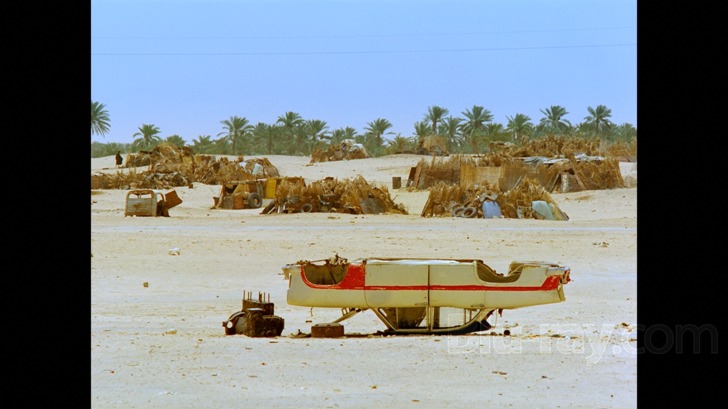
- English Commentary with Werner Herzog. Herzog is once again joined by Norm Hill and Crispin Glover in this good piece. Herzog details some of the rigors of the shoot as well as his original concept for the film which was jettisoned after he actually took a look at his footage.
Fata Morgana Blu-ray Movie, Overall Score and Recommendation 
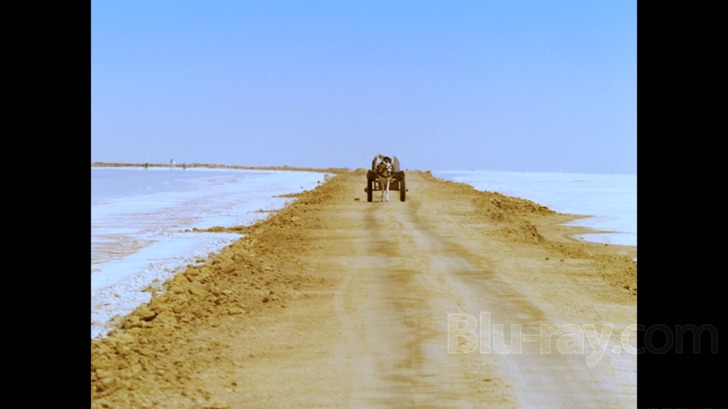
Fata Morgana may be better appreciated as a concept than as an actual viewing experience. That said, it's still fascinating in a typically Herzogian fashion, combining completely odd elements in an unusual and at times rather provocative way. Alternately hypnotic, disturbing (lots of images of dead carcasses littering the desert) and funny, Fata Morgana is another completely unique film from this always unpredictable auteur. Recommended.
Similar titles
Similar titles you might also like
(Still not reliable for this title)

Woyzeck
1979

The Enigma of Kaspar Hauser
Jeder für sich und Gott gegen alle
1974

Stroszek
1977

Where the Green Ants Dream
Wo die grünen Ameisen träumen
1984

Heart of Glass
Herz aus Glas
1976

Cobra Verde
1987

Little Dieter Needs to Fly
1997

Even Dwarfs Started Small
Auch Zwerge haben klein angefangen
1970

Land of Silence and Darkness
Land des Schweigens und der Dunkelheit
1971

Ballad of the Little Soldier
Ballade vom kleinen Soldaten
1984

Lessons of Darkness
Lektionen in Finsternis
1992

My Best Fiend
Mein liebster Feind - Klaus Kinski
1999

Huie's Sermon
1981

God's Angry Man
1981

Aguirre, the Wrath of God
Aguirre, der Zorn Gottes
1972

Fitzcarraldo
1982

How Much Wood Would a Woodchuck Chuck
1976

The Great Ecstasy of Woodcarver Steiner
1974

Nosferatu the Vampyre
Nosferatu: Phantom der Nacht
1979

Sans Soleil
1983